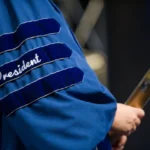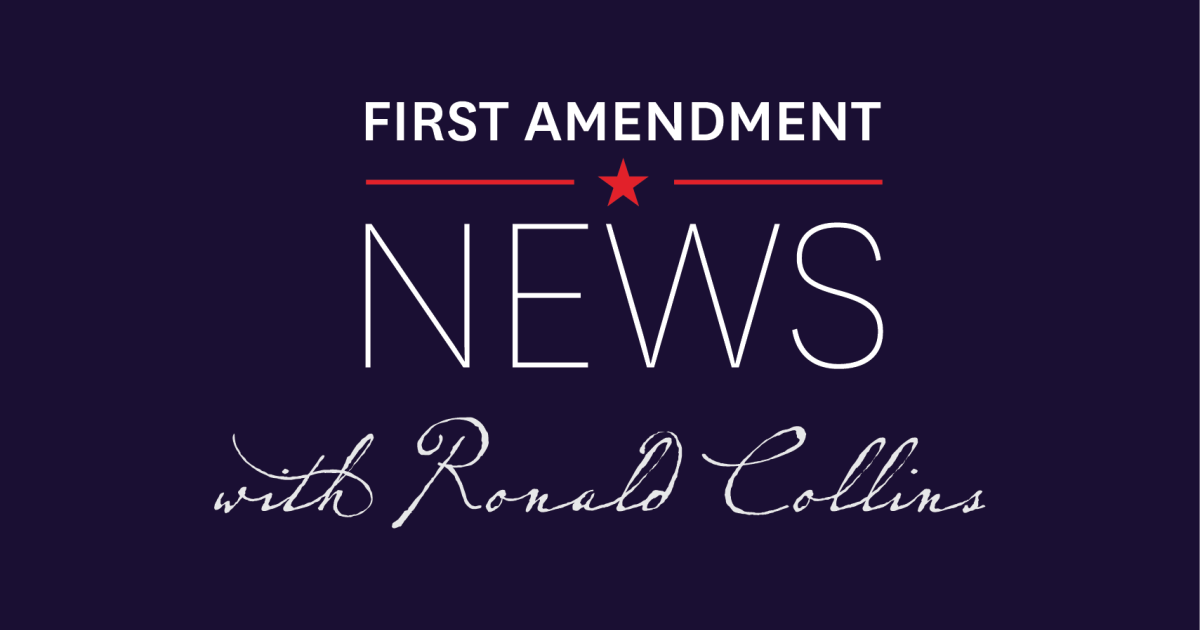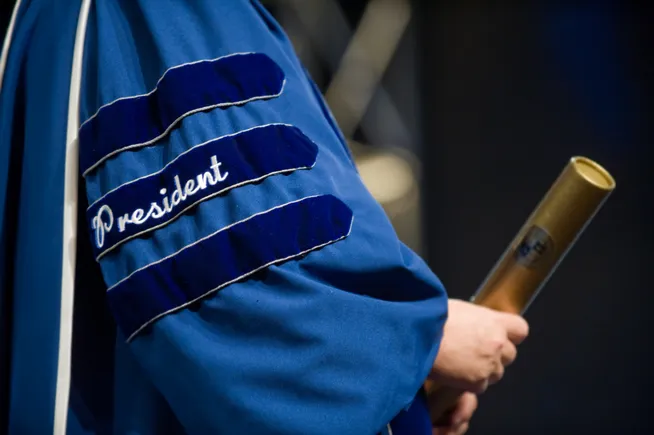Though the constitutional competition is great, free speech issues continue to weigh heavily in the scheme of things. Take, for example, the First Amendment issues raised in the following six cases on the Robert Court’s cert. docket:
1. Protests in public places near abortion clinics.
The powerhouse team of Paul Clement and Erin Murphy are counsel for the petitioners in Coalition Life v. City of Carbondale. The issue raised in this case is whether the Court should overrule Hill v. Colorado.
2. Free speech rights vs governmental claims of qualified immunity.
In Villarreal v. Alaniz, Robert Corn-Revere, FIRE’s counsel for the petitioner, asks the Justices to consider an important qualified immunity issue as it relates to First Amendment rights:
1. Whether it obviously violates the First Amendment to arrest someone for asking government officials questions and publishing the information they volunteer.
2. Whether qualified immunity is unavailable to public officials who use a state statute in a way that obviously violates the First Amendment, as decisions from the Sixth, Eighth, and Tenth Circuits have held; or whether qualified immunity shields those officials, as the Fifth Circuit held below.
3. Peaceful protests on public passageways.
Then there is the peaceful protest “obstructing a public passageway” issue raised in Henderson v. Texas. As Savannah Kumar, the Texas ACLU counsel for the petitioners, presents it:
Petitioners assembled with others in a brief, peaceful march along a historic Texas street. The march took place primarily on the sidewalk, but when necessary to change direction or in response to water narrowing their path, the marchers at times stepped onto the street. During the brief march, an unidentified cyclist, who was not shown to have any connection to Petitioners, slowed traffic for 20-90 seconds. There is no evidence that Petitioners themselves obstructed traffic or directed or intended that anyone else do so. Petitioners were nonetheless convicted under a state statute that bars obstructing a passageway, and the court below affirmed their convictions based on the actions of unnamed others and “the crowd.”
4. Retaliatory arrests
Murphy v. Schmitt raises a free speech issue at the constitutional intersection of probable cause and retaliatory arrests. Marie Miller, counsel of record for the Institute for Justice, sets forth the issues as:
- Whether the Nieves v. Bartlett’s probable-cause exception allows courts to consider allegations that no one else has been arrested for the same crime.
- Whether the Nieves probable-cause exception allows courts to consider an arresting officer’s statements made after an arrest.
Here, the petitioner engaged in protected speech when talking with a police officer, who arrested him.
5. Constitutionality of mandatory disclosure of political donor laws.
In No on E, San Franciscans Opposing the Affordable Care Housing Production Act, et al. v. Chiu, the issues raised are:
- Whether requiring political advertisers to name their donors’ donors within their advertisements advances any important or compelling state interest.
- Whether San Francisco’s secondary donor speech mandate violates the First Amendment freedoms of speech and association.
Alan Gura of the Institute for Free Speech is the counsel of record for the petitioner.
6. Speech vs. conduct dichotomy and the use of occupational licensing laws to regulate drones.
Finally, there is 360 Virtual Drone Services LLC v Ritter. The issue presented in the case is set out by Samuel B. Gedge (Institute for Justice) as follows:
Whether, in an as-applied First Amendment challenge to an occupational-licensing law, the standard for determining whether the law regulates speech or regulates conduct is this Court’s traditional conduct-versus-speech dichotomy.
NYPD appoints First Amendment protest supervisor
An NYPD inspector has been tapped to become the department’s First Amendment protest supervisor — a newly created position mandated by a federal legal settlement forcing police to overhaul how they handle demonstrations, the Daily News has learned.
The settlement was reached last September after talks between the city, various lawyers and advocacy groups and state Attorney General Letitia James, who had sued the NYPD in 2021 accusing the nation’s largest police force of various abuses during the George Floyd protests that roiled the city the year before.
Before taking on the new position, NYPD Inspector Joseph Hayward spent the bulk of his 25-year career in Brooklyn and Queens and has been cited 15 times for excellent or meritorious police duty.
He was accused of using excessive force during a November 2011 confrontation between police and Occupy Wall Street protesters at Zuccotti Park.
Protester charged with violating New York county’s face mask ban
A pro-Palestinian protester wearing a keffiyeh scarf has been charged with violating a suburban New York City county’s new law banning face masks in public, reviving fears from opponents that the statute is being used to diminish free speech rights.
Police said the 26-year-old North Bellmore resident was arrested Sunday afternoon during a protest in front of Young Israel of Lawrence-Cedarhurst, an orthodox synagogue near the New York City borough of Queens.
Nassau County Police Department spokesperson Scott Skrynecki said Thursday that officers questioned the man because he had been concealing his face with a keffiyeh, which has become a symbol of support for Palestinian people.
Police on the scene asked him if he was wearing the garment for medical or religious purposes, which are the two major exceptions to the new ban, according to Skrynecki. When the man confirmed he was wearing it in solidarity with Palestinians and not for either of those reasons, he was placed under arrest, Skrynecki said. He was eventually released with a notice to appear in court on Oct. 2.
Forthcoming scholarly article on overbroad protest laws

Protests are woven into the history and social fabric of the United States. Whether the topic involves racial inequity, abortion, police brutality, oil and gas pipelines, immigration, war, or allegedly stolen elections, Americans will voice their opposition, often in large groups and occasionally in frightening or destructive ways. Politicians, in turn, have a long history of using their lawmaking power to discourage protest, typically in the form of laws creating crimes like unlawful assembly, riot, civil disorder, disorderly conduct, and others. While lawmakers have considerable power to decide what is and isn’t legal, they cannot criminalize expression or assembly that the First Amendment protects. But the lines delineating what protest the government can and cannot criminalize are anything but bright.
This article aims to provide much-needed clarity on the question of how far lawmakers can go in prohibiting protest. It does so by illuminating a notoriously murky area of First Amendment doctrine: overbreadth. The overbreadth doctrine authorizes courts to strike down laws that are written so broadly as to infringe on constitutionally protected expression. Overbreadth concerns are especially acute in the context of laws used to criminalize protests.
The article makes three significant contributions to overbreadth scholarship. First, the article analyzes decades of Supreme Court caselaw addressing overbreadth claims arising from protests and articulates five features of protest-related laws that generate overbreadth concerns. Second, the article surveys an array of statutes that lawmakers and law enforcement officials have recently used or specifically enacted to deter protests and, employing the five features of potentially overbroad laws, examines which of these statutes present overbreadth concerns. Third, the article closes with a series of guidelines for eliminating or correcting overbroad protest laws.
House passes ‘Respecting the First Amendment on Campus Act’
On a bipartisan vote this afternoon, the House passed what would be the most comprehensive federal statutory protections for free speech on campus ever. The legislation now heads to the Senate. The bill, which includes the Respecting the First Amendment on Campus Act, requires public institutions of higher education to ensure their free speech policies align with Supreme Court precedent that protects students’ rights — regardless of their ideology or viewpoint.
Protecting free speech on college campuses has always been central to FIRE’s mission. It has taken on even greater urgency over the past year as campuses across the country were rocked by protests over the Israeli-Palestinian conflict, with many responding by cracking down on expressive rights. Even Congress started out on the wrong foot, passing legislation that targeted protected speech on campus. As FIRE Executive Vice President Nico Perrino last December, the best path forward is not doubling down on censorship and the inevitable double standards it creates, but ending it.
“The solution to this moral cowardice is not to expand the use of vague and overbroad harassment codes so that they apply in more cases,” Perrino wrote. “Rather, administrators should eliminate these codes and defend free speech in all cases. No hypocrisy. No double standards.”
State senator sues professor for criticizing book

- Years after Oklahoma historian James Gregory raised academic misconduct concerns about Pennsylvania state Sen. Doug Mastriano’s research, Mastriano sued him for defamation and federal claims ranging from RICO to antitrust violations.
- FIRE is seeking to have Mastriano’s lawsuit thrown out because it threatens academic freedom and James’ First Amendment right to criticize public officials.
- Mastriano’s lawsuit is a textbook “SLAPP” case, in which powerful individuals sue their critics into silence through long, costly litigation.
After Pennsylvania state Sen. Doug Mastriano sued Oklahoma historian James P. Gregory Jr. for criticizing his academic research, the Foundation for Individual Rights and Expression is stepping in to defend James’ First Amendment right to question powerful public officials.
James is a museum director and Ph.D. candidate who did nothing more than raise legitimate concerns about the quality of Mastriano’s academic scholarship, engaging in expression squarely protected by the First Amendment.
“Historians arrive at the truth by debating ideas, inviting skepticism, and challenging assumptions and sources,” said James. “By trying to silence that debate, Mastriano is literally on the wrong side of history — and history will prevail.”
To vindicate James’ rights, FIRE is asking the court to dismiss the case. Not only are Mastriano’s federal claims baseless, but his defamation claim is subject to an Oklahoma law that allows courts to swiftly dismiss lawsuits targeting protected speech.
Ex-professor raises First Amendment defense after being fired for making porn films

In a closely watched First Amendment rights case, a former University of Wisconsin campus chancellor who was fired after making pornographic films with his wife argued Friday for keeping his tenured teaching position even as he faces removal for unethical behavior.
Joe Gow, who had served as chancellor of UW-La Crosse for nearly 17 years, hoped to convince a personnel committee of the University of Wisconsin Board of Regents to recommend he be allowed to retain tenure and return to teaching communications courses.
Gow has been on paid leave from his faculty position since the regents fired him as chancellor in 2023, shortly after university leaders became aware of the videos that were posted on pornographic websites.
Gow’s behavior has been “unethical, hypocritical and unacceptable,” university attorney Wade Harrison told six regents who form the personnel committee on Friday.
“Enough is enough,” he said. “Dr. Joe needs to go.”
New scholarly note on the problem of silencing via spending or the new risk of ‘drowning out’
Money in politics. It’s an old problem, seemingly overwritten and unsolvable. Campaigns grow more expensive. Politicians genuflect to large corporate donors. And after Citizens United v. FEC, laws designed to stem political money’s flow seem destined for the Supreme Court’s dustbin. Although these difficulties feel familiar, the risks of campaign money are evolving — and so too is the need for regulation.
[ . . . ]
This Note confronts the emergent problem of silencing via spending — what it will call the new risk of “drowning out.” Just as sufficiently loud spoken speech can overwhelm others’ capacity to speak and be heard, money can also generate an expressive inundation, newly possible in our internet era. Campaign money may now purchase targeted and destructive communicative tools. At high enough spending levels, these tools could be used to entirely block opposing views and saturate voters’ informational environments with a single perspective. Thus, under certain conditions, unchecked political spending may now permit one side to effectively end debate before it begins.
This novel “drowning out” problem differs from the familiar twin difficulties of campaign finance: the challenges of corruption and distortion. A “drowning out” is not troubling because it corrupts politicians, making them less representative, nor because it skews political debate in favor of the wealthy, distorting political outcomes. A “drowning out” is troubling because it eliminates debate altogether, rupturing the participatory debate framework undergirding our democracy.
Earlier generations of scholars gestured at a potential for “drowning out.” Although the risk has taken on a new and dangerous shape in our twenty-first-century speech environment, recent scholarship has rarely attended to it. This Note fills that gap. It outlines the dimensions of a novel iteration of the “drowning out” problem and charts means of addressing it. Part I describes the rise of the new “drowning out” difficulty. Part II theorizes the difficulty, articulating how money, like speech, can be understood as having “sound” and thus can enact a “drowning out.” Finally, Part III outlines paths forward. If states enact new spending caps designed to prevent “drowning outs,” they will face significant legal obstacles. But there may be avenues for justifying such regulations, despite inhospitable doctrine.
ABC7 News Bay Area: Stanford announces new free speech policies
After a contentious time earlier this year which led to student arrests, barricades and graffiti on several buildings, Stanford released what are called the ‘freedom of expression’ policies.

More in the news
- Associated Press, “Sheriff Condemned for Saying People With Harris Signs Should Have Addresses Recorded,” First Amendment Watch (Sept. 20)
- Eugene Volokh, “Security Clearance Denied for Watching Furry Porn Depicting Animated 16-Year-Olds,” The Volokh Conspiracy (Sept. 20)
- The Associated Press, “California Laws Cracking Down on Election Deepfakes by AI Face Legal Challenges,” First Amendment Watch (Sept. 19)
- Eugene Volokh, “Man Indicted For Threatening To Lynch ‘Corrupt’ Justice Thomas And His ‘Insurrectionist’ Wife,” The Volokh Conspiracy (Sept. 19)
- IFS staff, “Can the Government Ban TikTok? (TikTok Inc. v. Merrick Garland),” Institute for Free Speech (Sept. 16)
2024-2025 SCOTUS term: Free expression and related cases
Pending petitions
Last scheduled FAN
FAN 440: “Can the Supreme Court empower public schools to regulate off-campus speech? No!”
This article is part of First Amendment News, an editorially independent publication edited by Ronald K. L. Collins and hosted by FIRE as part of our mission to educate the public about First Amendment issues. The opinions expressed are those of the article’s author(s) and may not reflect the opinions of FIRE or Mr. Collins.
#Whats #deck #upcoming #Court #term #Amendment #News










